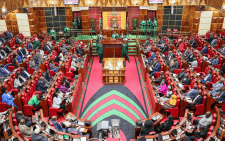Kenya Revenue Authority’s (KRA) recent system shutdown has severely disrupted tea exports at the Port of Mombasa, leading to significant financial losses. Kenya exports around 150 tea containers through Mombasa daily, translating to about $25 million (Sh3.2 billion) in weekly revenue.
However, KRA’s system shutdown, which has now lasted five days, left 750 tea containers stuck at the port. Exporters have had to contend with rising demurrage and logistics costs, adding to the financial strain.
The East African Tea Trade Association (EATTA) chairman Arthur Sewe and Managing Director George Omuga warned that prolonged delays could result in shipping companies bypassing Mombasa for other ports, which would disrupt both import and export activities and lead to further economic losses.
The two detailed how the breakdown of the Integrated Customs Management System (ICMS) and scanner issues brought tea exportation to a halt.
The situation threatens not only immediate revenue but also the broader stability of the tea industry.
A prolonged shutdown could even force a suspension of the Mombasa Tea Auction, which would mean losses potentially reaching Sh3.26 billion each week. Sewe emphasised the urgency, stating: “The country as it is today cannot afford to lose such an amount of money.” He called on the government to take swift action to stabilise the system and mitigate mounting costs.
Omuga added that the crisis highlights ongoing inefficiencies in port management. He noted that EATTA had previously engaged with multiple government agencies, including Kenya Ports Authority (KPA), Kenya Revenue Authority, KenTrade, Kenya Plant Health Inspectorate Service (Kephis), and Port Health, to address recurring issues hampering exports.
However, little progress has been made on the identified concerns. Omuga called on the government to take tea exports more seriously, given that the Mombasa auction also serves teas from 10 African countries.
“Our inefficiency at the Port of Mombasa will send the wrong signals to producer member countries, which might compel them to look for alternative export ports,” he said. The repercussions of these delays extend beyond Kenya’s borders, with potential impacts on key trade partners in Europe.
According to Tea Buyers Association chairman Peter Kimanga, the timing of the shutdown is especially problematic because Kenya is currently in its peak export season to Europe, where tea stockpiles are built up ahead of winter.
He raised concerns that the delays could affect Kenya’s reputation as a reliable tea supplier, especially for value-added products now being shipped directly to European supermarkets.
“If we cannot deliver these teas on time, we risk being blacklisted as an unreliable supplier of value-added teas,” Kimanga warned.
Adding to the strain, Kenya has been struggling with unsold tea stockpiles in Mombasa. Some teas that were previously purchased are still awaiting shipment, creating a backlog that is likely to grow as fresh tea supplies from farms continue to arrive.
Kimanga said that these delays are shifting the financial burden onto Kenyan farmers, as buyers are unwilling to absorb these added costs. “Ultimately, all these costs will be shouldered by the Kenyan farmer because the buyer cannot cushion those costs,” he said.





















